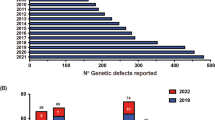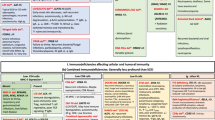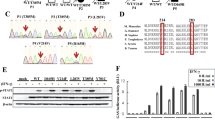Abstract
Purpose
Inherited deficiencies of CD40 and CD40 ligand (CD40L) reflect the crucial immunological functions of CD40–CD40L interaction/signaling. Although numerous studies have provided a detailed description of CD40L deficiency, reports of CD40 deficiency are scarce. Herein, we describe the characteristics of all reported patients with CD40 deficiency.
Methods
The PubMed, Embase and Web of Science databases were searched for relevant literature published till 7th August 2023. Study deduplication and identification of relevant reports was performed using the online PICO Portal. The data were extracted using a pre-designed data extraction form and the SPSS software was used for analysis.
Results
Systematic literature review revealed 40 unique patients with CD40 deficiency. Respiratory tract and gastrointestinal infections were the predominant clinical manifestations (observed in 93% and 57% patients, respectively). Sclerosing cholangitis has been reported in nearly one-third of patients. Cryptosporidium sp. (29%) and Pneumocystis jirovecii (21%) were the most common microbes identified. Very low to undetectable IgG levels and severely reduced/absent switch memory B cells were observed in all patients tested/reported. Elevated IgM levels were observed in 69% patients. Overall, splice-site and missense variants were the most common (36% and 32%, respectively) molecular defects identified. All patients were managed with immunoglobulin replacement therapy and antimicrobial prophylaxis was utilized in a subset. Hematopoietic stem cell transplantation (HSCT) has been performed in 45% patients (curative outcome observed in 73% of these patients). Overall, a fatal outcome was reported in 21% patients.
Conclusions
We provide a comprehensive description of all important aspects of CD40 deficiency. HSCT is a promising curative treatment option for CD40 deficiency.






Similar content being viewed by others
Data Availability
Relevant data/methods utilized in the preparation of this manuscript are provided in the manuscript and electronic supplementary material. Additional data underlying this article will be shared on reasonable request to the corresponding author.
References
van Kooten C, Banchereau J. Functions of CD40 on B cells, dendritic cells and other cells. Curr Opin Immunol. 1997;9(3):330–7. https://doi.org/10.1016/s0952-7915(97)80078-7.
Hollenbaugh D, Grosmaire LS, Kullas CD, Chalupny NJ, Braesch-Andersen S, Noelle RJ, et al. The human T cell antigen gp39, a member of the TNF gene family, is a ligand for the CD40 receptor: expression of a soluble form of gp39 with B cell co-stimulatory activity. EMBO J. 1992;11(12):4313–21. https://doi.org/10.1002/j.1460-2075.1992.tb05530.x.
Laman JD, Claassen E, Noelle RJ. Functions of CD40 and its ligand, gp39 (CD40L). Crit Rev Immunol. 2017;37(2–6):371–420. https://doi.org/10.1615/CritRevImmunol.v37.i2-6.100.
Ma DY, Clark EA. The role of CD40 and CD154/CD40L in dendritic cells. Semin Immunol. 2009;21(5):265–72. https://doi.org/10.1016/j.smim.2009.05.010.
Aruffo A, Farrington M, Hollenbaugh D, Li X, Milatovich A, Nonoyama S, et al. The CD40 ligand, gp39, is defective in activated T cells from patients with X-linked hyper-IgM syndrome. Cell. 1993;72(2):291–300. https://doi.org/10.1016/0092-8674(93)90668-g.
Tangye SG, Al-Herz W, Bousfiha A, Cunningham-Rundles C, Franco JL, Holland SM, et al. Human inborn errors of immunity: 2022 update on the classification from the International Union of Immunological Societies Expert Committee. J Clin Immunol. 2022;42(7):1473–507. https://doi.org/10.1007/s10875-022-01289-3.
Ferrari S, Giliani S, Insalaco A, Al-Ghonaium A, Soresina AR, Loubser M, et al. Mutations of CD40 gene cause an autosomal recessive form of immunodeficiency with hyper IgM. Proc Natl Acad Sci U S A. 2001;98(22):12614–9. https://doi.org/10.1073/pnas.221456898.
França TT, Barreiros LA, Al-Ramadi BK, Ochs HD, Cabral-Marques O, Condino-Neto A. CD40 ligand deficiency: treatment strategies and novel therapeutic perspectives. Expert Rev Clin Immunol. 2019;15(5):529–40. https://doi.org/10.1080/1744666X.2019.1573674.
Hirbod-Mobarakeh A, Aghamohammadi A, Rezaei N. Immunoglobulin class switch recombination deficiency type 1 or CD40 ligand deficiency: from bedside to bench and back again. Expert Rev Clin Immunol. 2014;10(1):91–105. https://doi.org/10.1586/1744666X.2014.864554.
Lougaris V, Badolato R, Ferrari S, Plebani A. Hyper immunoglobulin M syndrome due to CD40 deficiency: clinical, molecular, and immunological features. Immunol Rev. 2005;203:48–66. https://doi.org/10.1111/j.0105-2896.2005.00229.x.
Page MJ, McKenzie JE, Bossuyt PM, Boutron I, Hoffmann TC, Mulrow CD, et al. The PRISMA 2020 statement: an updated guideline for reporting systematic reviews. BMJ. 2021;372:n71. https://doi.org/10.1136/bmj.n71.
PICO Portal. Identifying duplicates with PICO Portal. 2022. Available from: https://picoportal.org/2022/02/01/identifying-duplicates-with-pico-portal/. Accessed 7 Aug 2023.
Banday AZ, Jindal AK, Kaur A, Kumar Y, Nameirakpam J, Patra PK, Rawat A. A young girl with hypogammaglobulinemia and granulomatous hepatitis caused by a novel mutation in ZBTB24 gene: a case based analysis. Immunobiology. 2020;225(3):151912. https://doi.org/10.1016/j.imbio.2020.151912.
Kutukculer N, Moratto D, Aydinok Y, Lougaris V, Aksoylar S, Plebani A, et al. Disseminated cryptosporidium infection in an infant with hyper-IgM syndrome caused by CD40 deficiency. J Pediatr. 2003;142(2):194–6. https://doi.org/10.1067/mpd.2003.41.
Mazzolari E, Lanzi G, Forino C, Lanfranchi A, Aksu G, Ozturk C, et al. First report of successful stem cell transplantation in a child with CD40 deficiency. Bone Marrow Transplant. 2007;40(3):279–81. https://doi.org/10.1038/sj.bmt.1705713.
Karaca NE, Forveille M, Aksu G, Durandy A, Kutukculer N. Hyper-immunoglobulin M syndrome type 3 with normal CD40 cell surface expression. Scand J Immunol. 2012;76(1):21–5. https://doi.org/10.1111/j.1365-3083.2012.02697.x.
Al-Saud BK, Al-Sum Z, Alassiri H, Al-Ghonaium A, Al-Muhsen S, Al-Dhekri H, et al. Clinical, immunological, and molecular characterization of hyper-IgM syndrome due to CD40 deficiency in eleven patients. J Clin Immunol. 2013;33(8):1325–35. https://doi.org/10.1007/s10875-013-9951-9.
Mishra A, Italia K, Gupta M, Desai M, Madkaikar M. Hyperimmunoglobulin syndrome due to CD40 deficiency: possibly the first case from India. J Postgrad Med. 2015;61(1):46–8. https://doi.org/10.4103/0022-3859.147053.
Murguia-Favela L, Sharfe N, Karanxha A, Bates A, Dadi H, Cimpean L, Roifman CM. CD40 deficiency: a unique adult patient with hyper immunoglobulin M syndrome and normal expression of CD40. LymphoSign J. 2017;4(2):70–6. https://doi.org/10.14785/lymphosign-2017-0004.
Bahrami A, Soltani Z, Fazlollahi MR, Rahmani F, Houshmand M, Mazinani M, Rezaei N. Adenoid hyperplasia in a patient with a rare type of hyper immunoglobulin M syndrome due to CD40 deficiency. Acta Med Iran. 2018:811–4. Available from: https://acta.tums.ac.ir/index.php/acta/article/download/7252/5201/. Accessed 30 Nov 2022.
Al-Saud B, Al-Jomaie M, Al-Ghonaium A, Al-Ahmari A, Al-Mousa H, Al-Muhsen S, et al. Haematopoietic stem cell transplant for hyper-IgM syndrome due to CD40 defects: a single-centre experience. Bone Marrow Transplant. 2019;54(1):63–7. https://doi.org/10.1038/s41409-018-0219-0.
Renner ED, Krätz CE, Orange JS, Hagl B, Rylaarsdam S, Notheis G, et al. Class switch recombination defects: impact on B cell maturation and antibody responses. Clin Immunol. 2021;222:108638. https://doi.org/10.1016/j.clim.2020.108638.
Akarsu A, Halaçlı S, Tan Ç, Kuşkonmaz B, Küpesiz A, Çetinkaya D, et al. A single-center study points to diverse features and outcome in patients with hyperimmunoglobulin M syndrome and class‐switch recombination defects. Scand J Immunol. 2022;96(5):e13213. https://doi.org/10.1111/sji.13213.
Rawat A, Sharma M, Vignesh P, Jindal AK, Suri D, Das J, et al. Utility of targeted next generation sequencing for inborn errors of immunity at a tertiary care centre in North India. Sci Rep. 2022;12(1):10416. https://doi.org/10.1038/s41598-022-14522-1.
Hsu J, Massaad M, Notarangelo LD. Successful hematopoietic stem cell transplant for CD40 deficiency manifesting as hyper-IgM syndrome with absent CD40 expression and marked lymphocytosis. J Allergy Clin Immunol. 2014;133(2):AB95. https://doi.org/10.1016/j.jaci.2013.12.354.
Leven EA, Maffucci P, Ochs HD, Scholl PR, Buckley RH, Fuleihan RL, et al. Hyper IgM syndrome: a report from the USIDNET Registry. J Clin Immunol. 2016;36(5):490–501. https://doi.org/10.1007/s10875-016-0291-4.
Galal N, Meshaal S, Elhawary R, ElAziz DA, Alkady R, Lotfy S, et al. Patterns of primary immunodeficiency disorders among a highly consanguineous population: Cairo University Pediatric Hospital’s 5-year experience. J Clin Immunol. 2016;36(7):649–55. https://doi.org/10.1007/s10875-016-0314-1.
Barbouche MR, Mekki N, Ben-Ali M, Ben-Mustapha I. Lessons from genetic studies of primary immunodeficiencies in a highly consanguineous population. Front Immunol. 2017;8:737. https://doi.org/10.3389/fimmu.2017.00737.
Fioredda F, Pierri F, Palmisani E, Finocchi A, Di Matteo G, Palumbo G, et al. Severe chronic neutropenia: primary immunodeficiency mutations are frequent causative agents. Blood. 2018;132(S1):2402. https://doi.org/10.1182/blood-2018-99-114462.
El-Helou SM, Biegner AK, Bode S, Ehl SR, Heeg M, Maccari ME, et al. The German National Registry of primary immunodeficiencies (2012–2017). Front Immunol. 2019;10:1272. https://doi.org/10.3389/fimmu.2019.01272.
Linares NA, Bouchard M, Gutiérrez NS, Colmenares M, Cantor-Garcia A, Gabaldon-Figueira JC, et al. Immunological features in pediatric patients with recurrent and severe infection: identification of primary immunodeficiency diseases in Merida, Venezuela. Allergol Immunopathol (Madr). 2019;47(5):437–48. https://doi.org/10.1016/j.aller.2019.02.002.
Belaid B, Lamara Mahammed L, Drali O, Oussaid AM, Touri NS, Melzi S, et al. Inborn errors of immunity in Algerian children and adults: a single-center experience over a period of 13 years (2008–2021). Front Immunol. 2022;13:900091. https://doi.org/10.3389/fimmu.2022.900091.
Vonniessen N, Ahmed E, Hazzazi K, Mourad W, Mazer B. Profiling B-cell response: Hyperimmunoglobulin M syndrome due to CD40 deficiency. J Allergy Clin Immunol. 2023;151(2):AB334. https://doi.org/10.1016/j.jaci.2022.12.774.
Fontana S, Moratto D, Mangal S, De Francesco M, Vermi W, Ferrari S, et al. Functional defects of dendritic cells in patients with CD40 deficiency. Blood. 2003;102(12):4099–106. https://doi.org/10.1182/blood-2003-04-1244.
Lanzi G, Ferrari S, Vihinen M, Caraffi S, Kutukculer N, Schiaffonati L, et al. Different molecular behavior of CD40 mutants causing hyper-IgM syndrome. Blood. 2010;116(26):5867–74. https://doi.org/10.1182/blood-2010-03-274241.
Cicalese MP, Gerosa J, Baronio M, Montin D, Licciardi F, Soresina A, et al. Circulating follicular helper and follicular regulatory T cells are severely compromised in human CD40 deficiency: a case report. Front Immunol. 2018;9:1761. https://doi.org/10.3389/fimmu.2018.01761.
Kutukculer N, Aksoylar S, Kansoy S, Cetingul N, Notarangelo LD. Outcome of hematopoietic stem cell transplantation in hyper-IgM syndrome caused by CD40 deficiency. J Pediatr. 2003;143(1):141–2. https://doi.org/10.1016/S0022-3476(03)00274-9.
Dirim D, Dagci H, Turgay N. Disseminated cryptosporidiosis in Turkey: case report. East Afr Med J. 2003;80(10):550–2. https://doi.org/10.4314/eamj.v80i10.8760.
Al-Dhekri H, Al-Sum Z, Al-Saud B, Al-Mousa H, Ayas M, Al-Muhsen S, et al. Successful outcome in two patients with CD40 deficiency treated with allogeneic HCST. Clin Immunol. 2012;143(1):96–8. https://doi.org/10.1016/j.clim.2012.01.012.
Wintergerst U, Durandy A, Belohradsky BH. Clinical course of a female patient with CD40-deficiency. Clin Exp Immunol. 2008;154(S1):186.
Cella M, Sallusto F, Lanzavecchia A. Origin, maturation and antigen presenting function of dendritic cells. Curr Opin Immunol. 1997;9(1):10–6. https://doi.org/10.1016/s0952-7915(97)80153-7.
Mehta HM, Corey SJ. G-CSF, the guardian of granulopoiesis. Semin Immunol. 2021;54:101515. https://doi.org/10.1016/j.smim.2021.101515.
Mavroudi I, Papadaki V, Pyrovolaki K, Katonis P, Eliopoulos AG, Papadaki HA. The CD40/CD40 ligand interactions exert pleiotropic effects on bone marrow granulopoiesis. J Leukoc Biol. 2011;89(5):771–83. https://doi.org/10.1189/jlb.0610330.
Solanilla A, Déchanet J, El Andaloussi A, Dupouy M, Godard F, Chabrol J, et al. CD40-ligand stimulates myelopoiesis by regulating flt3-ligand and thrombopoietin production in bone marrow stromal cells. Blood. 2000;95(12):3758–64.
Pollheimer MJ, Halilbasic E, Fickert P, Trauner M. Pathogenesis of primary sclerosing cholangitis. Best Pract Res Clin Gastroenterol. 2011;25(6):727–39. https://doi.org/10.1016/j.bpg.2011.10.009.
Stephens J, Cosyns M, Jones M, Hayward A. Liver and bile duct pathology following Cryptosporidium parvum Infection of immunodeficient mice. Hepatology. 1999;30(1):27–35. https://doi.org/10.1002/hep.510300138.
Ungar BL, Burris JA, Quinn CA, Finkelman FD. New mouse models for chronic Cryptosporidium Infection in immunodeficient hosts. Infect Immun. 1990;58(4):961–9. https://doi.org/10.1128/iai.58.4.961-969.1990.
Ponnuraj EM, Hayward AR. Requirement for TNF-Tnfrsf1 signalling for sclerosing cholangitis in mice chronically infected by Cryptosporidium parvum. Clin Exp Immunol. 2002;128(3):416–20. https://doi.org/10.1046/j.1365-2249.2002.01861.x.
Pollheimer MJ, Fickert P. Animal models in primary biliary Cirrhosis and primary sclerosing cholangitis. Clin Rev Allergy Immunol. 2015;48(2–3):207–17. https://doi.org/10.1007/s12016-014-8442-y.
Levy J, Espanol-Boren T, Thomas C, Fischer A, Tovo P, Bordigoni P, et al. Clinical spectrum of X-linked hyper-IgM syndrome. J Pediatr. 1997;131(1 Pt 1):47–54. https://doi.org/10.1016/s0022-3476(97)70123-9.
Winkelstein JA, Marino MC, Ochs H, Fuleihan R, Scholl PR, Geha R, et al. The X-linked hyper-IgM syndrome: clinical and immunologic features of 79 patients. Medicine (Baltim). 2003;82(6):373–84. https://doi.org/10.1097/01.md.0000100046.06009.b0.
Du X, Tang W, Chen X, Zeng T, Wang Y, Chen Z, et al. Clinical, genetic and immunological characteristics of 40 Chinese patients with CD40 ligand deficiency. Scand J Immunol. 2019;90(4):e12798. https://doi.org/10.1111/sji.12798.
Mitsui-Sekinaka K, Imai K, Sato H, Tomizawa D, Kajiwara M, Nagasawa M, et al. Clinical features and hematopoietic stem cell transplantations for CD40 ligand deficiency in Japan. J Allergy Clin Immunol. 2015;136(4):1018–24. https://doi.org/10.1016/j.jaci.2015.02.020.
Khalil IA, Troeger C, Rao PC, Blacker BF, Brown A, Brewer TG, et al. Morbidity, mortality, and long-term consequences associated with Diarrhoea from Cryptosporidium Infection in children younger than 5 years: a meta-analyses study. Lancet Glob Health. 2018;6(7):e758-68. https://doi.org/10.1016/S2214-109X(18)30283-3.
Hijjawi N, Zahedi A, Al-Falah M, Ryan U. A review of the molecular epidemiology of Cryptosporidium spp. and Giardia Duodenalis in the Middle East and North Africa (MENA) region. Infect Genet Evol. 2022;98:105212. https://doi.org/10.1016/j.meegid.2022.105212.
Aloui C, Prigent A, Sut C, Tariket S, Hamzeh-Cognasse H, Pozzetto B, et al. The signaling role of CD40 ligand in platelet biology and in platelet component transfusion. Int J Mol Sci. 2014;15(12):22342–64. https://doi.org/10.3390/ijms151222342.
de la Morena MT, Leonard D, Torgerson TR, Cabral-Marques O, Slatter M, Aghamohammadi A, et al. Long-term outcomes of 176 patients with X-linked hyper-IgM syndrome treated with or without hematopoietic cell transplantation. J Allergy Clin Immunol. 2017;139(4):1282–92. https://doi.org/10.1016/j.jaci.2016.07.039.
Modell V, Knaus M, Modell F, Roifman C, Orange J, Notarangelo LD. Global overview of primary immunodeficiencies: a report from Jeffrey Modell Centers worldwide focused on diagnosis, treatment, and discovery. Immunol Res. 2014;60(1):132–44. https://doi.org/10.1007/s12026-014-8498-z.
Acknowledgements
LDN is supported by the Division of Intramural Research, National Institute of Allergy and Infectious Diseases, Bethesda, MD, USA.
Funding
None.
Author information
Authors and Affiliations
Contributions
AZB, RN: Conception of idea and design of the study; literature review; acquisition, analysis, and interpretation of data; and drafted, edited, and revised the manuscript.
PKP, AK, RS, CC, STAB, SZB: Editing and revision of the manuscript; acquisition, analysis, and interpretation of data; and literature review.
DB, LDN: Editing and critical revision of the manuscript; interpretation of data; literature review; and overall supervision of manuscript preparation.
All authors approve the final version of the manuscript.
Corresponding author
Ethics declarations
Ethics Approval
As this study pertains to literature review and analysis of previously published data, ethics approval and consent is not mandated.
Consent to Participate and Consent for Publication
Not applicable.
Conflict of Interest or Competing Interests
None.
Note
All figures provided in this article are original and have not been published elsewhere. Multiple affiliations of the first author (AZB) are sequential affiliations that have changed during the course of the work.
Additional information
Publisher’s Note
Springer Nature remains neutral with regard to jurisdictional claims in published maps and institutional affiliations.
Aaqib Zaffar Banday and Rahila Nisar contributed equally and qualify as joint first authors.
Supplementary Information
Below is the link to the electronic supplementary material.
ESM 1
(PDF 270 KB)
Rights and permissions
Springer Nature or its licensor (e.g. a society or other partner) holds exclusive rights to this article under a publishing agreement with the author(s) or other rightsholder(s); author self-archiving of the accepted manuscript version of this article is solely governed by the terms of such publishing agreement and applicable law.
About this article
Cite this article
Banday, A.Z., Nisar, R., Patra, P.K. et al. Clinical and Immunological Features, Genetic Variants, and Outcomes of Patients with CD40 Deficiency. J Clin Immunol 44, 17 (2024). https://doi.org/10.1007/s10875-023-01633-1
Received:
Accepted:
Published:
DOI: https://doi.org/10.1007/s10875-023-01633-1




